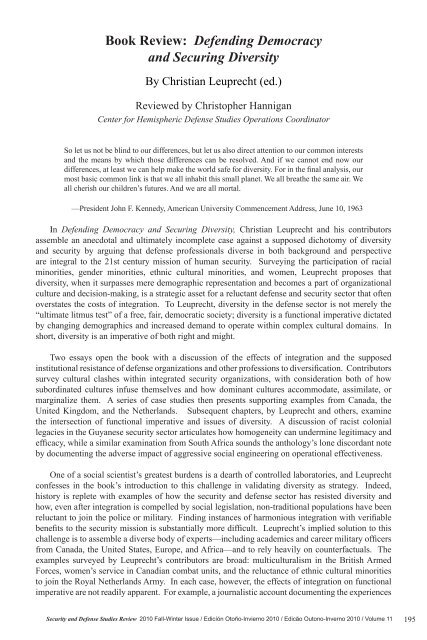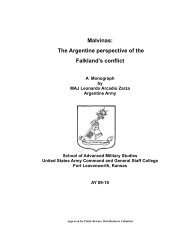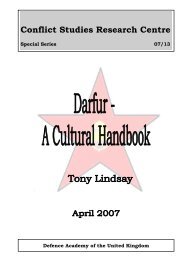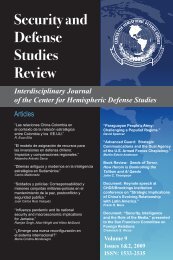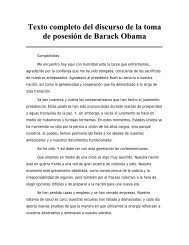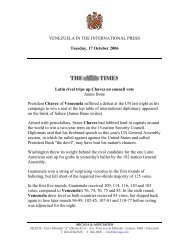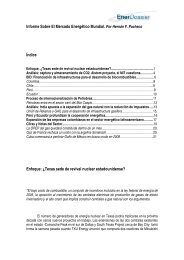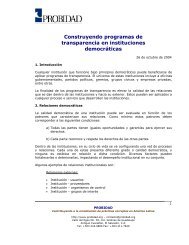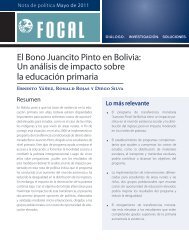Security and Defense Studies Review 2010 Fall ... - Offnews.info
Security and Defense Studies Review 2010 Fall ... - Offnews.info
Security and Defense Studies Review 2010 Fall ... - Offnews.info
- No tags were found...
Create successful ePaper yourself
Turn your PDF publications into a flip-book with our unique Google optimized e-Paper software.
Book <strong>Review</strong>: Defending Democracy<strong>and</strong> Securing DiversityBy Christian Leuprecht (ed.)<strong>Review</strong>ed by Christopher HanniganCenter for Hemispheric <strong>Defense</strong> <strong>Studies</strong> Operations CoordinatorSo let us not be blind to our differences, but let us also direct attention to our common interests<strong>and</strong> the means by which those differences can be resolved. And if we cannot end now ourdifferences, at least we can help make the world safe for diversity. For in the final analysis, ourmost basic common link is that we all inhabit this small planet. We all breathe the same air. Weall cherish our children’s futures. And we are all mortal.—President John F. Kennedy, American University Commencement Address, June 10, 1963In Defending Democracy <strong>and</strong> Securing Diversity, Christian Leuprecht <strong>and</strong> his contributorsassemble an anecdotal <strong>and</strong> ultimately incomplete case against a supposed dichotomy of diversity<strong>and</strong> security by arguing that defense professionals diverse in both background <strong>and</strong> perspectiveare integral to the 21st century mission of human security. Surveying the participation of racialminorities, gender minorities, ethnic cultural minorities, <strong>and</strong> women, Leuprecht proposes thatdiversity, when it surpasses mere demographic representation <strong>and</strong> becomes a part of organizationalculture <strong>and</strong> decision-making, is a strategic asset for a reluctant defense <strong>and</strong> security sector that oftenoverstates the costs of integration. To Leuprecht, diversity in the defense sector is not merely the“ultimate litmus test” of a free, fair, democratic society; diversity is a functional imperative dictatedby changing demographics <strong>and</strong> increased dem<strong>and</strong> to operate within complex cultural domains. Inshort, diversity is an imperative of both right <strong>and</strong> might.Two essays open the book with a discussion of the effects of integration <strong>and</strong> the supposedinstitutional resistance of defense organizations <strong>and</strong> other professions to diversification. Contributorssurvey cultural clashes within integrated security organizations, with consideration both of howsubordinated cultures infuse themselves <strong>and</strong> how dominant cultures accommodate, assimilate, ormarginalize them. A series of case studies then presents supporting examples from Canada, theUnited Kingdom, <strong>and</strong> the Netherl<strong>and</strong>s. Subsequent chapters, by Leuprecht <strong>and</strong> others, examinethe intersection of functional imperative <strong>and</strong> issues of diversity. A discussion of racist coloniallegacies in the Guyanese security sector articulates how homogeneity can undermine legitimacy <strong>and</strong>efficacy, while a similar examination from South Africa sounds the anthology’s lone discordant noteby documenting the adverse impact of aggressive social engineering on operational effectiveness.One of a social scientist’s greatest burdens is a dearth of controlled laboratories, <strong>and</strong> Leuprechtconfesses in the book’s introduction to this challenge in validating diversity as strategy. Indeed,history is replete with examples of how the security <strong>and</strong> defense sector has resisted diversity <strong>and</strong>how, even after integration is compelled by social legislation, non-traditional populations have beenreluctant to join the police or military. Finding instances of harmonious integration with verifiablebenefits to the security mission is substantially more difficult. Leuprecht’s implied solution to thischallenge is to assemble a diverse body of experts—including academics <strong>and</strong> career military officersfrom Canada, the United States, Europe, <strong>and</strong> Africa—<strong>and</strong> to rely heavily on counterfactuals. Theexamples surveyed by Leuprecht’s contributors are broad: multiculturalism in the British ArmedForces, women’s service in Canadian combat units, <strong>and</strong> the reluctance of ethnic cultural minoritiesto join the Royal Netherl<strong>and</strong>s Army. In each case, however, the effects of integration on functionalimperative are not readily apparent. For example, a journalistic account documenting the experiences<strong>Security</strong> <strong>and</strong> <strong>Defense</strong> <strong>Studies</strong> <strong>Review</strong> <strong>2010</strong> <strong>Fall</strong>-Winter Issue / Edicíón Otoño-Invierno <strong>2010</strong> / Edicão Outono-Inverno <strong>2010</strong> / Volume 11 195


